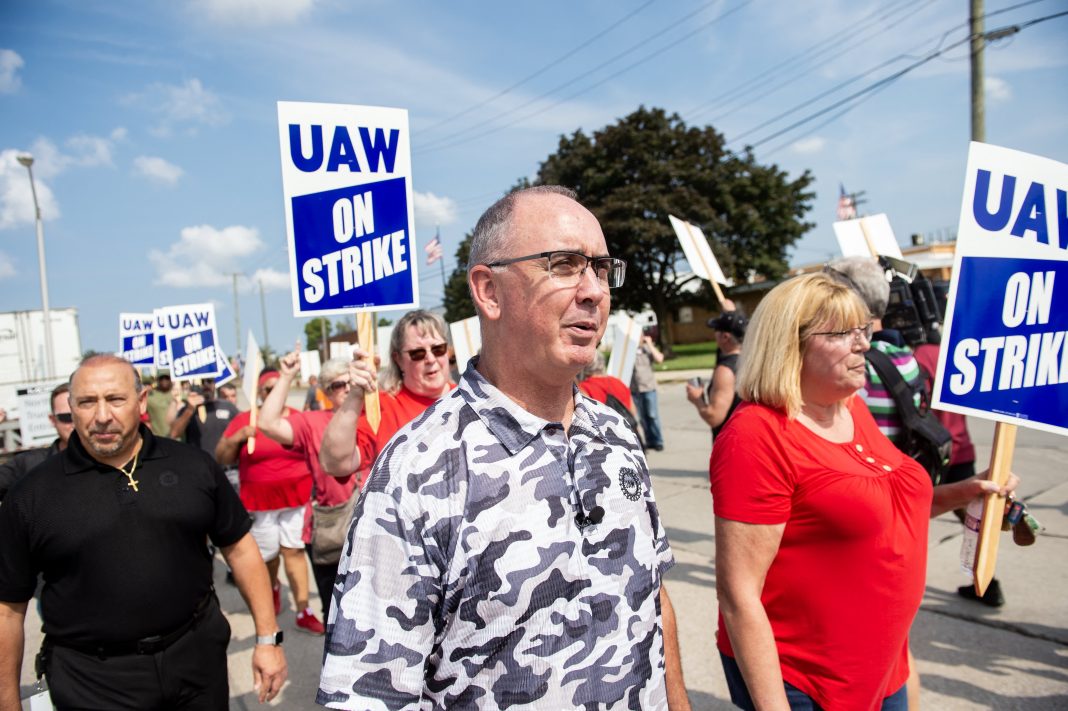Title: UAW Threatens Work Stoppages, Posing Challenges for the U.S. Automotive Industry
Introduction:
After the historic strikes by the United Auto Workers (UAW) against Detroit automakers last year, the union is once again preparing for potential work stoppages that could disrupt the U.S. automotive industry. The UAW recently announced a strike deadline at a Ford Motor tool and die plant, as well as plans for strike authorization votes at Stellantis plants. These developments highlight the union’s ongoing concerns about local contracts and union workers’ rights.
Risks and Warning Shots Against Ford and Stellantis:
The strike deadline set by the UAW for the Ford Motor tool and die plant near Detroit highlights the union’s focus on specific local issues. The plant plays a crucial role in supporting the production of Ford’s highly profitable F-150 pickup truck. If a strike occurs at this facility, it could potentially impact vehicle assembly if the automaker fails to make contingency plans for parts. However, Ford remains optimistic about ongoing negotiations, emphasizing the company’s investments and commitment to finding a resolution.
Similarly, the UAW’s strike authorization votes at Stellantis plants reflect the union’s dissatisfaction with the automaker’s product cuts, layoffs, and potential moves of production outside the U.S. UAW President Shawn Fain has been vocal in his criticism of Stellantis and CEO Carlos Tavares. The union has filed unfair labor practice claims against the company, accusing it of withholding relevant information regarding investments and products. These actions by the UAW demonstrate their determination to protect workers’ rights and advocate for their interests.
The Complexity of Local Contracts:
While UAW members are covered by national agreements that address issues such as wages and benefits, local contracts tailored to each facility often take months, or even years, to settle. The UAW’s recent actions highlight the challenges in reaching satisfactory local agreements within the broader framework of national contracts. Last year’s national negotiations resulted in record wage increases for workers, but labor experts cautioned that these gains might come at the cost of jobs.
Strike Authorization Votes and Potential Strikes:
The UAW’s strike authorization votes serve as procedural steps to empower union leaders to call for a strike if necessary. Typically, these votes receive strong support from workers, with more than 90% approval. However, it’s important to note that the company involved in the dispute may contest the legality of a strike, as Stellantis has done in response to the UAW’s actions.
Ongoing Negotiations and Future Implications:
Ford and Stellantis both expressed their commitment to ongoing negotiations with the UAW. These negotiations are crucial for reaching mutually beneficial agreements that address the concerns of the union and the automakers. The outcome of these negotiations will have significant implications for the U.S. automotive industry, including the smooth operation of assembly plants and the overall well-being of workers.
Expanding Influence: Contract Negotiations with Volkswagen:
In addition to their ongoing disputes with Ford and Stellantis, the UAW has initiated contract negotiations with Volkswagen (VW) after VW workers in Chattanooga, Tennessee, voted in favor of UAW representation earlier this year. This expansion of the UAW’s influence reflects the continued efforts of the union to advocate for workers’ rights across the automotive industry.
Conclusion:
The UAW’s recent actions, including strike deadlines and authorization votes, underscore the ongoing challenges in reaching satisfactory local agreements within the broader context of national contracts. The negotiations between the UAW and automakers like Ford, Stellantis, and Volkswagen will shape the future of the U.S. automotive industry and have far-reaching implications for workers and the overall economy. It remains to be seen how these negotiations will unfold and whether they will result in mutually beneficial outcomes that address the concerns of all parties involved.

